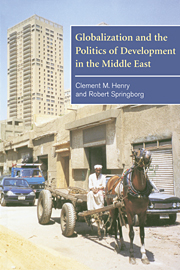Book contents
- Frontmatter
- Contents
- List of figures
- List of tables
- Preface and acknowledgments
- Glossary
- Map. The Middle East and North Africa
- 1 Overview
- 2 The challenges of globalization
- 3 Political capacities and capitalist legacies
- 4 Bunker states
- 5 Bully praetorian states
- 6 Globalizing monarchies
- 7 Fragmented democracies
- 8 Conclusion
- References
- Index
8 - Conclusion
Published online by Cambridge University Press: 05 June 2012
- Frontmatter
- Contents
- List of figures
- List of tables
- Preface and acknowledgments
- Glossary
- Map. The Middle East and North Africa
- 1 Overview
- 2 The challenges of globalization
- 3 Political capacities and capitalist legacies
- 4 Bunker states
- 5 Bully praetorian states
- 6 Globalizing monarchies
- 7 Fragmented democracies
- 8 Conclusion
- References
- Index
Summary
In the preceding chapters we have sought to demonstrate that MENA economies are not performing at levels commensurate with their factor endowments, and to explain this inadequacy as a result of political factors at the global, regional, and national levels. Globalization, today's equivalent to yesterday's imperialism, at least in many of its impacts on non-Western economies, is the primary external thesis against which MENA countries are reacting. Having formerly been sustained by global rents resulting from geo-political considerations or hydrocarbon extraction, regimes throughout the region are now having to make dramatic adjustments to capture new sources of revenue, most of which are private, hence less susceptible than global rents to political pressures and calculations. These adjustments are having profound domestic consequences. They are bifurcating elites into “globalizes” and “mora-lizers,” the former of which seek to be local apostles for the Washington Consensus, the latter of which are seeking either to reject globalization in its entirety, or to formulate a synthesis between it and nativist, primarily Islamic values and practices. Threatened by both the ardent globalizes and the moralizers, most regimes are cautiously seeking to control the pace and content of globalization, lest they be swept away by it. As yet none of the regimes has succumbed to this fate, nor will they necessarily, as gradual adaptation may enable them to survive, albeit in modified form.
- Type
- Chapter
- Information
- Globalization and the Politics of Development in the Middle East , pp. 223 - 229Publisher: Cambridge University PressPrint publication year: 2001

